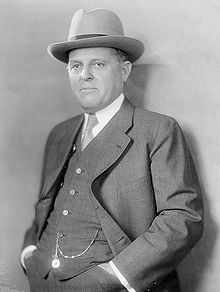Butler B. Hare
Butler Black Hare (born November 25, 1875 in Leesville , Edgefield County , South Carolina , † December 30, 1967 in Saluda , South Carolina) was an American politician . Between 1925 and 1933 and again from 1939 to 1947 he represented the state of South Carolina in the US House of Representatives .
Career
Butler Hare was born on a farm in present-day Saluda County in 1875 . He attended the public schools of his home country and then until 1899 the Newberry College . Between 1901 and 1903 he worked as a teacher. In 1904 and 1905 he served on the staff of Congressmen George W. Croft and Theodore G. Croft . From 1906 to 1908, Hare taught history and economics at Leesville College . In 1908 and 1909 he worked for the Federal Labor Office ( Bureau of Labor ) on a study on women and child labor. Until 1913 he continued his own education by studying at George Washington University in Washington, DC . There he studied law, among other things.
After being admitted to the bar in 1913, he began working in his new profession in Saluda in 1915. He also worked for the U.S. Department of Agriculture between 1911 and 1924 . At the same time he was active in agriculture himself. Politically, Hare became a member of the Democratic Party . In 1924 he was elected to the US House of Representatives in Washington in the second constituency of South Carolina, where he succeeded James F. Byrnes on March 4, 1925 . After three re-elections, he was able to complete four consecutive terms in Congress by March 3, 1933 . From 1931 to 1933 he was chairman of the Committee on Insular Affairs . Shortly before the end of his provisionally last term in Congress, the 20th Amendment to the Constitution came into effect, bringing the terms of office of Congress and President forward to January. This shortened the time between the elections in November and the beginning of the new legislative period or the new term of office.
In 1932, Hare declined to run again. As a result, he returned to his private business. He returned to the political scene in 1938 when he was re-elected to the US House of Representatives in the third district of his state. There he replaced John C. Taylor on January 3, 1939 . After three re-elections, he was able to spend four more legislative terms in Congress until January 3, 1947. During this time the Second World War fell and after its end the founding of the UN and the beginning of the Cold War .
In 1946, Hare was no longer nominated by his party for another term in Congress. He then withdrew from politics and worked again as a lawyer and in agriculture. Butler Hare died on December 30, 1967 in Saluda and was buried there. His son James (1918-1966) also represented the third district of the state of South Carolina in the US House of Representatives between 1949 and 1951.
Web links
- Butler B. Hare in the Biographical Directory of the United States Congress (English)
- Butler B. Hare in the database of Find a Grave (English)
| personal data | |
|---|---|
| SURNAME | Hare, Butler B. |
| ALTERNATIVE NAMES | Hare, Butler Black (full name) |
| BRIEF DESCRIPTION | American politician |
| DATE OF BIRTH | November 25, 1875 |
| PLACE OF BIRTH | Leesville , South Carolina |
| DATE OF DEATH | December 30, 1967 |
| Place of death | Saluda , South Carolina |


